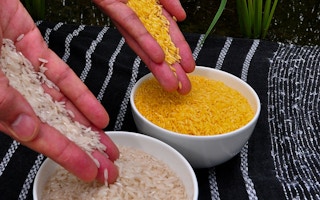More than 110 Nobel laureates have now signed on to an open letter calling for an end to the efforts led by Greenpeace opposing the use of genetically modified organisms (GMO) in agriculture.
The letter is addressed not just to Greenpeace but also to the United Nations and “Governments around the world.” After noting that the UN Food & Agriculture Program projects that global production of food, feed, and fiber will need to double by 2050 in order to meet the demands of the growing global population, the Nobel laureates write:
“Organisations opposed to modern plant breeding, with Greenpeace at their lead, have repeatedly denied these facts and opposed biotechnological innovations in agriculture. They have misrepresented their risks, benefits, and impacts, and supported the criminal destruction of approved field trials and research projects.”
In particular, the Nobel winners take issue with Greenpeace’s opposition to Golden Rice, a genetically modified crop that they say has the potential to “reduce or eliminate much of the death and disease caused by a vitamin A deficiency.”
“
We urge Greenpeace and its supporters to re-examine the experience of farmers and consumers worldwide with crops and foods improved through biotechnology.
Nobel laureates, in an open letter to Greenpeace-led opposition to GMO
According to the letter, the World Health Organisation has estimated that as many as 250 million people worldwide suffer from vitamin A deficiency, including 40 per cent of children in the developing world who are under five years old.
“We urge Greenpeace and its supporters to re-examine the experience of farmers and consumers worldwide with crops and foods improved through biotechnology, recognise the findings of authoritative scientific bodies and regulatory agencies, and abandon their campaign against ‘GMOs’ in general and Golden Rice in particular,” the Nobel laureates write.
“How many poor people in the world must die before we consider this a ‘crime against humanity’?” they ask.
Greenpeace was quick to respond to the accusations made in the letter. Wilhelmina Pelegrina, a campaigner with Greenpeace Southeast Asia, said in a statement that “Accusations that anyone is blocking genetically engineered ‘Golden’ rice are false. ‘Golden’ rice has failed as a solution and isn’t currently available for sale, even after more than 20 years of research. As admitted by the International Rice Research Institute, it has not been proven to actually address Vitamin A Deficiency. So to be clear, we are talking about something that doesn’t even exist.”
Pelegrina accused corporations of “overhyping” Golden rice as a means of clearing the way for approval of other, more profitable genetically engineered crops. “This costly experiment has failed to produce results for the last 20 years and diverted attention from methods that already work. Rather than invest in this overpriced public relations exercise, we need to address malnutrition through a more diverse diet, equitable access to food and eco-agriculture,” she said.
Greenpeace Southeast Asia has documented communities across the Philippines that are concerned about using Golden rice, Pelegrina added, calling it “irresponsible to impose GE ‘Golden’ rice as a quick remedy to people on the frontlines and who do not welcome it, particularly when there are safe and effective options already available.”
This story is published with permission from Mongabay.

















